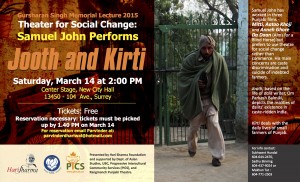Montreal, 14 April 2015
FOR IMMEDIATE RELEASE
Spinning rhetoric and reality — India’s Prime Minister, Narendra Modi
India’s Prime Minster, Mr. Narendra Modi, begins a three-day official visit to Canada today. That the Canadian Government accords the visit great significance is indicated by the fact that Prime Minister Harper will participate in events in all three cities on Mr. Modi’s itinerary – Ottawa, Toronto and Vancouver. For most members of the Indian diaspora here in Canada, basking in the reflected glory of an India soon to outpace China in terms of economic growth, this is their moment in the sun as an assertive leader of an aspiring nation takes centre stage. He looks to the future and doesn’t look back and given his track record they feel the authoritative Mr. Modi means business. Indeed he has promised India ‘good governance’, the Gujarat model (the state he was Chief Minister of until he became Prime Minister of India) of rapid and sustained growth and has spoken up for the girl-child. And to businesses in Canada and the rest of a growth-starved developed west he has promised market opportunities in an India on the cusp of outpacing China and an authoritative leader who can deliver growth and governance.
But in looking ahead and turning a new page Mr. Modi and the BJP (Bharatiya Janata Party), the party he leads, want us to forget the past, a past that includes among other horrors the destruction of the historic Babri mosque in 1992, the re-writing of school texts to eulogize Hitler, and the Gujarat genocide of 2002 in which Muslim women in particular were brutally raped and killed while the government of Mr. Modi stood by instead of protecting them. Since the proverbial leopard does not change its spots, Mr. Modi’s Hindu nationalist roots, and his earlier record do not portend well, for the majority of Indians. Even as he ostensibly concentrates on authoritative governance and growth, the BJP and its sister organisations of the Sangh Parivar – an ensemble of religious, social and political organisations tied together by the ideology of Hindu nationalism (Hindutva, making India a Hindu nation) — take forward their ideological agenda. Starting with ‘ghar vapasi’ (return to the fold) – a thinly-veiled religious reconversion programme to Hinduism directed to Christians and Muslims – which has been suspended but not discontinued, to the deification of Mahatma Gandhi’s assassin Nathuram Godse and the continuing vandalisation of churches, police custodial murders of Muslim youth, pulping of academic books that meet with the ire of Hindutva ideologues, all indications are that Mr. Modi and the Sangh Parivar are intent on imposing an exclusivist, narrow, intolerant Hindu identity on this plural nation. A plurality, tolerance and inclusiveness that was reflected in the visions of Mahatma Gandhi, Rabindranath Tagore, Khudiram Bose, Subhas Bose, B.R. Ambedkar, Jawaharlal Nehru, Bhagat Singh, Mridula Sarabhai, Chandrasekhar Azad, and scores of others. And which for the most part has guided India’s post-colonial growth as a nation.
Neither is it clear that the much vaunted neo-liberal Gujarat model is one that the rest of India should follow. For example the Tamil Nadu model (a state in South India) of universal access, has delivered much better outcomes, compared with Gujarat, in terms of health, education, nutrition and gender-equity. Finally, to cater to the demands of big business and corporations, Mr. Modi’s attempts to repeal parts of the Land Act brought into law by the Indian Parliament in 2013 to increase compensation for land acquisition, paid to farmers as well as those who live off that land, suggests that he is willing to govern in the interests of the few rather than the many.
So as Canada and Canadians get ready to fete Mr. Modi and celebrate the many achievements of the world’s largest democracy it is worthwhile asking in which direction he and the Sangh Parivar intend to take India. A chauvinistic Hindu India with a neoliberal market economy is good neither for Indians nor the rest of the world.
CERAS, Montreal
(Centre sur l’asie du sud — forum for peace, secularism and democratic development in South Asia)
514-485-9192 cerasmontreal@gmail.com
SANSAD, Vancouver
(South Asian Network for Secularism and Democracy)
604-421-6752 sansad@sansad.org
